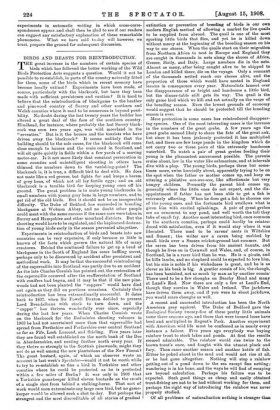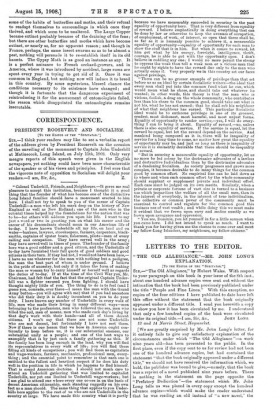BIRDS AND BEASTS FOR REINTRODUCTION.
THE great increase in the numbers of certain species of birds which has followed the better working of the Wild Birds Protection Acts suggests a question. Would it not be possible to re-establish, in parts of the country naturally fitted for them, some of the birds which in recent memory have become locally extinct ? Experiments have been made, of course, particularly with the blackcock, but have they been made with sufficient persistence and caution P It is hard to believe that the reintroduction of blackgame to the heather and pinewood country of Surrey and other southern and Welsh counties where it used to be numerous is beyond possi- bility. No doubt during the last twenty years the builder has altered a great deal of the face of the southern country. Hindhead, for instance, where probably the last Surrey black- cock was seen two years ago, was wild moorland in the "seventies." But is it the houses and the tourists who have driven away the blackcock ? It seems unlikely that the building should be the sole cause, for the blackcock will come close enough to houses and the main road in Scotland, and will sit quite quietly in fields within a few yards of a moving motor-car. Is it not more likely that constant persecution in some counties and unintelligent shooting in others have thinned the numbers down to the vanishing-point ? The blackcock is, it is true, a difficult bird to deal with. He does not mate like a red grouse, but fights for and keeps a harem of grey bens, of which not all lay fertile eggs ; and an old blackcock is a terrible bird for keeping young ones off his ground. The great problem is to mate young blackcocks in small numbers with young grey hens in large numbers, and to get rid of the old birds. But it should not be an insuperable difficulty. The Duke of Bedford has succeeded in breeding blackgame at Woburn Abbey, and no doubt other people could meet with the same success if the same care were taken in Surrey and Hampshire and other moorland districts. But the shooting would have to be regulated, and the haphazard destruc- tion of young birds early in the season prevented altogether.
Experiments in reintroauction of birds and beasts into new countries can be very expensive, if only because so little is known of the facts which govern the natural life of many creatures. Behind the continued failure to get up a head of blackgame in the South of England lies some baffling secret, perhaps only to be discovered by accident after persistent and methodical work. It may be that the successful reintroducing of the capercaillie into Scotland was partly due to an accident As the late Charles Cornish has pointed out, the restoration of the capercaillie occurred after the reafforestation of Scotland with conifers had begun, and it may be that if the new pine- woods had not been planted the " cappers would have died out again as they did on previous occasions. Certainly their reintroduction has been extraordinarily successful. It dates back to 1837, when Sir Powell Buxton decided to present Lord Breadalbane with stock to turn down, and the " capper " has thriven wonderfully ever since, especially during the last few years. When Charles Cornish wrote on the blackcock for the Badminton shooting volumes in 1903 he had not ascertained more than that capercaillie had spread from Perthshire and Forfarshire over central Scotland as far as Fife, Loch Lomond, and Stirling. Five years later they are found well established on the north bank of the Dee in Aberdeenshire, and nesting further north every year. If they thrive so strongly in the Scottish pinewoods, might they not do as well among the new plantations of the New Forest ? The great bustard, again, of which an observer wrote an account in last week's Spectator—would it not be worth while to try to re-establish so fine a bird in Yorkshire and other counties where he could be protected as he is protected within a few miles of Berlin ? It was only in 1808 that a Yorkshire gamekeeper killed eleven bustards as the le3ult of a single shot from behind a stalking-horse. That sort of work would soon exterminate any large rare bird, but no game- keeper would be allowed such a shot to-day. But perhaps the strangest and the most discreditable of all stories of gradual extinction or prevention of breeding of birds is our own modern English method of allowing a market for live quails
to be supplied from abroad. The quail is one of the most sporting little birds that flies, and yet he is killed down without mercy at the beginning of the breeding season on his way to our shores. When the quails start on their migration from Northern Africa to nest in Europe and England they are caught in thousands in nets along the shores of Africa, Greece, Sicily, and Italy. Large numbers die in the nets.
Almost as many, after being caught alive to be shipped to London and killed there, die on the voyage. Only a remnant of the thousands netted reach our shores alive, and the proportion of those which would have nested in England lessens in consequence every year. Naturalists lament over the disappearance of so bright and handsome a little bird, but the dinner-table still gets its way. The quail is the only game bird which we kill and eat actually on the verge of the breeding season. Even the lowest grounds of economy would suggest that he should be protected till the breeding season is over.
Mere protection in some eases has reintroduced disappear- ing species. One of the most interesting cases is the increase in the numbers of the great grebe. A few years ago the great grebe seemed likely to share the fate of the great auk, but since it has been jealously protected it has multiplied fast, and there are few large ponds in the kingdom which do not carry two or three pairs of this extremely handsome waterbird. To watch a pair of great grebes feeding their young is the pleasantest amusement possible. The parents cruise about, low in the water like submarines, and at intervals dive with a plop. The young birds, perhaps three but some- times more, swim hurriedly about, apparently trying to be on the spot when the father or mother comes up, and keep on uttering a plaintive wee-wee-wee, like affectionate but very hungry children. Presently the parent bird comes up, generally where the little ones do not expect, and the dis- appointment if father has not been able to get a fish is extremely affecting. When he does get a fish he chooses one of the young ones, and the fortunate bird swallows what is given him with excited splashings. A pair of great grebes are an ornament to any pond, and well worth the toll they take of small fry. Another most interesting bird, once commOn in the southern counties, perhaps could hardly be reintro- duced with satisfaction, even if it would stay where it was liberated. There used to be ravens' nests in Wiltshire and Sussex ; the writer saw a raven being mobbed by small birds over a Sussex cricket-ground last summer. But the raven has been driven from his ancient haunts, and though he lives on in Cornwall and Wales, and, of course, in Scotland, he is a rarer bird than he was. He is a pirate, and he kills lambs, and no shepherd could be expected to love him, but his size is noble if his wickedness is great, and he is as clever as his beak is big. A gentler cousin of his, the chough, has been banished, not so much by man as by another cousin' There used to be a few choughs on Beachy Head and many at Land's End. Now there are only a few at Land's End, though they survive in Wales and Ireland. The jackdaws have driven them away, and if you were to shoot jackdaws, you would scare choughs as well.
A recent and successful introduction has been the North American grey squirrel. The Duke of Bedford gave the Zoological Society twenty-five of these pretty little animals some three seasons ago, and those that were turned loose have bred and multiplied in Regent's Park. Another experiment with American wild life must be confessed as in nearly every instance a failure. Five years ago everybody was buying rainbow trout to stock lakes and ponds. At first the results seemed admirable. The rainbow would rise twice to the brown trout's once, and fought with the utmost pluck and fury. Then came another season and another kettle of fish. Either he poked about in the mud and would not rise at all, or he had gone altogether. Nothing will stop a rainbow getting out of a pond down to the sea except fine netting ; wandering is in his bone, and the ways he will find of escaping are beyond calculation. Perhaps his failure was to be expected. Such good things as cheap and easily obtained trout-fishing are not to be had without working for them, and perhaps the right way of introducing the rainbow was never properly studied.
Of all problems of naturalisation nothing is stranger than
some of the habits of butterflies and moths, and their refusal to readapt themselves to surroundings in which once they thrived, and which seem to be unaltered. The Large Copper became extinct probably because of the draining of the fans; but there are other butterflies and moths which have become extinct, or nearly so, for no apparent reason ; and though in France, perhaps, the same insect swarms so as to be almost a pest, nothing will persuade it to re-establish itself in its old haunts. The Gypsy Moth is as good an instance as any. It is a perfect nuisance to French orchard-growers, and in America, where it was introduced by accident, large sums are spent every year in trying to get rid of it. Once it was common in Englan3, but nothing now will induce it to breed in this country. By some mysterious, blessed chance the conditions necessary to its existence have changed ; and though it is fortunate that the dangerous experiment of reintroducing it for the amusement of entomologists failed, the reason which disappointed the entomologists remains inscrutable.







































 Previous page
Previous page